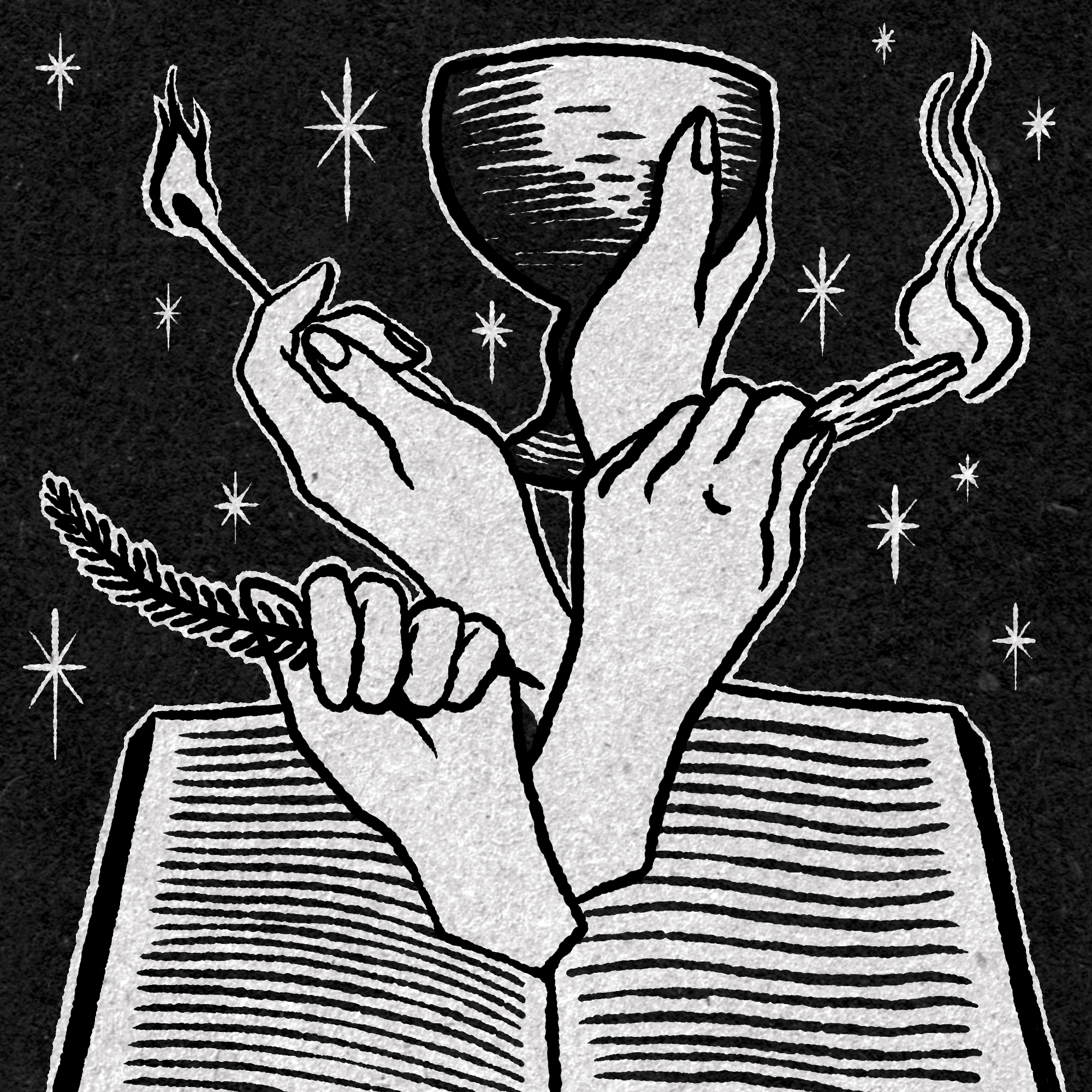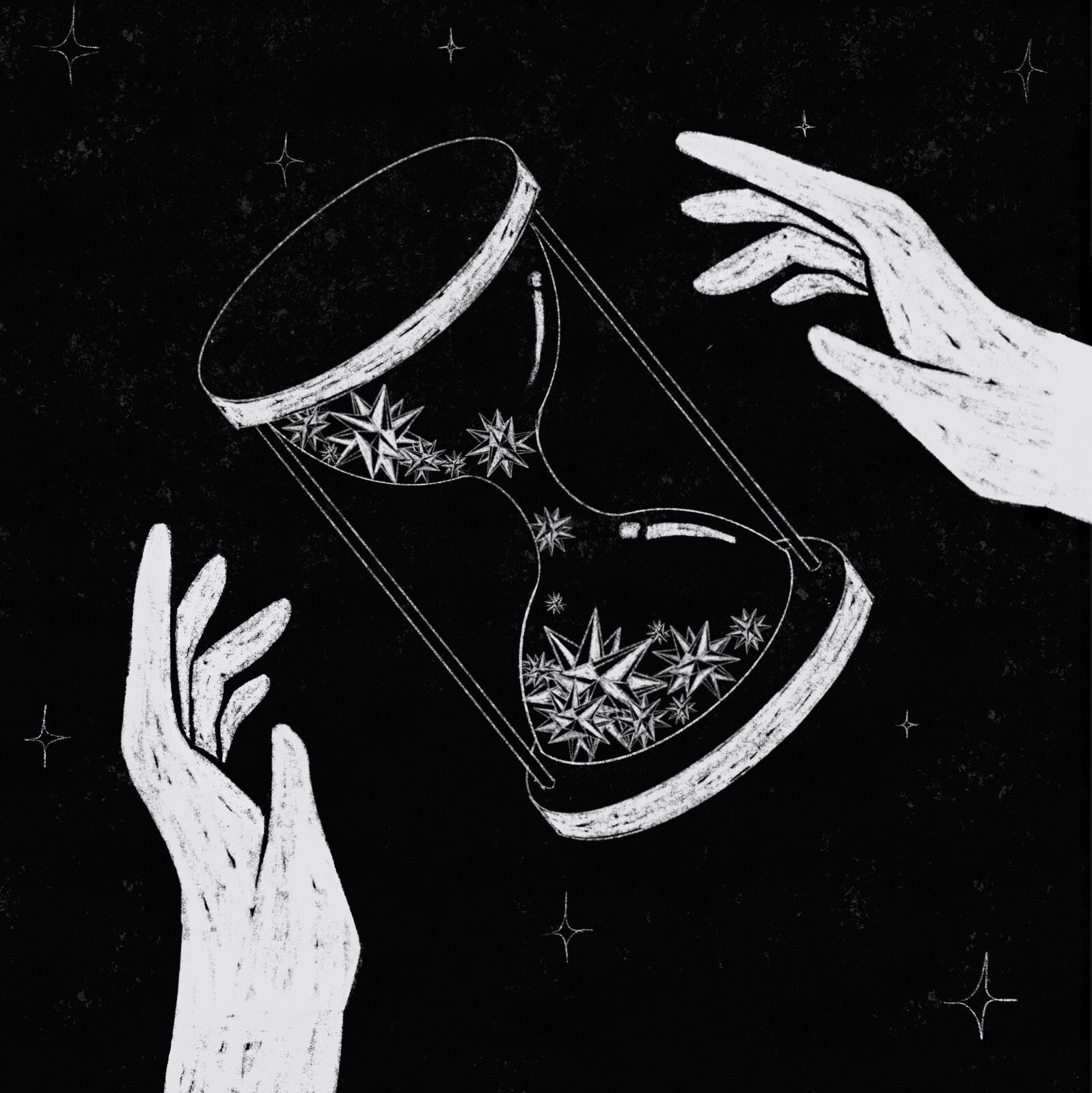Illustration © Kaitlynn Copithorne
We have been pretty terrible at keeping up this part of the website. It was intended as a place for unstructured musings, a public diary, blog and newsletter-adjacent. Three years later here’s out third diary update – better late than never.
Belated, but happy Beltane from us! Cunning Folk is now four years’ old, which is strange, because two of those years were full but two of them seem to have disappeared down a black hole, as I suppose was a near universal sentiment about lockdown. Of course, lockdown also helped improved accessibility, allowing participants from all around the world to participate digitally in events that would have once been held in cultural hubs such as London and New York. While many small businesses suffered, lockdown in some ways helped small businesses that relied on e-commerce. This weird period enabled many small presses to emerge. While some of us were paralysed by anxiety and unable to read, reading became one of the only ways many of us could escape our homes and find ourselves in other worlds. Other zines such as Weird Walk, Rituals and Declarations and Hellebore popped up around the same time as us, filling a hole in the market where people sought meaning, and alternatives to the devastating endpoint of capitalism.
So many of us hoped the world post-lockdown would change. Our Re-enchantment issue blossomed from this optimism. And the world has changed, but arguably not for the better. Recently I wrote about why we may not be going through a period of re-enchantment but intense disenchantment, confronted by the cost of living crisis, war and increasing inequality. The term “Re-enchantment” is being incorporated, like mindfulness, into an ever-growing number of sellable products destined to soothe our mental health, when what we often need is systemic change, including but not limited to higher pay, more affordable cost of living, and better work conditions.
Every magazine I see on the newsstand is now centred around anxiety and depression, two common afflictions that affect many of us. Yet I worry sometimes that the hyper focus on ourselves and our mental state exasperates our mental health issues and turns us away from pointing a finger at the root cause where there is one. And maybe that’s the point. In The Happiness Industry: How the Government and Big Business Sold Us Well-Being, author William Davies argues pithily about “the new religion of our age: emotions.” He writes: “The mood-tracking technologies, sentiment analysis algorithms and stress-busting meditation techniques are put to work in the service of certain political and economic interests.” This lockdown wave of magical zines weren’t intended to soothe or pacify; rather, they were intended to embolden readers and remind us of our agency, of cathedral-thinking, and of a world of other ways of being and knowing beyond our own.
Independent businesses and press are needed promote diversity of voice – offering an alternative to the homogenisation of culture. When they go well, they also offer individuals and families a source of income, far more sustainable than allowing money to keep pooling into rich corporations alone. But independent businesses are also increasingly feeling the strain of current times. Recent Kickstarters from Haunt Publishing, Knight Errant Press, and Butcher’s Dog Mag show this, as do closures of Aurelia, Gal Dem and Ambit.
Despite having an increasing number of readers, we are feeling the strain too. Zoe Williams of the Vagina Museum well articulates the situation in an email newsletter dated April 22nd, writing: “Between a pandemic, a cost of living crisis, and many other crises in between, everything has changed. One of those changes is that people have a lot less disposable income than back in 2019. In our 2019 crowdfunding campaign, 600 donors donated almost £50,000. In our present crowdfunder, to secure a new home, so far the picture is different. More than 700 donors have donated £20,000. The average amount that people are able to donate is far, far lower.”
You can support independent makers by:
Buying direct. This is the best way to support independent press. You can find Cunning Folk via our website shop. If something is out-of-stock, drop us an email to express interest in a reprint.
Buying from a stockist. We only sell at independent shops we love. Here’s a list of places where you can find Cunning Folk.
Check if your favourite indies have a Patreon which helps keep things sustainable, paying for contingency costs and basic overheads. Here’s a link to our Patreon.
Keep an eye on the socials of your favourite independent businesses, and support crowdfunders if you are able to.
While independents are struggling, mainstream publishing keeps thriving. When we read work produced by an increasingly and disproportionately wealthy splinter of society, our knowledge is inevitably narrower in scope. Which brings me onto another tangential topic – for which there’s arguably enough material for another diary entry.
Lockdown was an exciting time in that many people became acquainted for the first time with new ideas, such as magic and the occult. For many this would have meant visiting esoteric bookshops, joining covens or attempting to initiate into existing traditions.
After publishing an op-ed last month titled Toxic Masculinity and the Occult, we’ve had a staggering response from practitioners – many of whom agreed – some of whom found the piece challenging and acknowledged they had in some ways been complicit in the culture I described. A few people raised another question: is this a problem unique to the 19th-century lineage based traditions? The short answer: yes, but not entirely. It’s part of a process that’s been happening in the past few centuries of empire building and nationalism. Standardisation is necessary to enable both. Language, folklore and beliefs should, according to the tenets of standardisation, be prescriptive rather than descriptive.
In some ways standardisation is helpful: having a lingua franca like English unites a bigger community and makes communication easier. When something is standardised, there is a greater potential for regulating bodies to call out malpractices within it. But on the flip side, as Bell Hooks aptly described it, the resulting society is an “imperialist white supremacist capitalist patriarchy” where certain ideas are platformed and histories remembered, while others are ignored. Living in this context we miss out on cultural, linguistic and religious diversity in favour of “correctness”, and the slippery word “tradition”. People are in many ways products of cultures; we haven’t lived in a cultural milieu that acknowledges diversity and practises syncretism for al long time, even though this may well be changing. It is little surprise then that this cultural mindset of purism gives birth to new (occult or otherwise) schools of thought that favour cultural absolutes rather than embracing diversity. The word “tradition” is enticing – it suggests authenticity, a standard variety and continuity – but it absconds a much longer history of ideas exchange.
Daniel Simpson raises the same questions in his book The Truth of Yoga, where he examines the history of yoga and challenges the notion of “authenticity” and “lineage.” India increasingly embraced the idea of a unified yoga when seeking to become an independent nation. Beyond lineage claims and attempts towards standardisation, Simpson reveals yoga to have always been, at its roots, an electric body of literature and practice.
Challenging the idea of “tradition” creates panic among those who value it – even if this is a term scholars are increasingly putting into question. After all, when people refer to “traditional witchcraft” they are often referring to ideas that appeared in the mid-20th century; when ashtangis refer to “traditional practice” they are referring to a sequence of postures also developed in the 20th century.
Standardisation reassures us in a world with little sense of certainty, where we know, in reality, very little. Standardised traditions are sellable in a way eclecticism is not. It creates a sense of belonging to something akin to a family, with its support network, deep roots and illusion of permanency.
If we are thinking in binary terms, the alternative to standardisation is a chaotic borderless world of blurred boundaries and a plethora of ideas – porous and open to change. And history shows us this is true. The Christianity practised today is very different to that practised 1500 years ago. What’s more, there are a myriad of different ways Christianity is practised cross-culturally. Culture changes. To try to preserve a fixed point in time is like trying to convince the sand in the top of an hourglass to stay put. What is regarded traditional one day may one day be relegated to the history books as inhumane – bear bating is a case in point. And our language has changed dramatically with each generation of speakers. Old English is unintelligible to most modern readers.
Standardisation may or may not point us towards a path where a greater consensus has agreed something is of benefit. But whether we decide to follow a tradition or not, we can all become better at practising discernment, critical thinking and cultivating awareness of what is helpful and what is not for ourselves. Whether or not we follow a standardised religion or tradition, without discernment we can fall prey to grifters who sell snake oil – some of whom are eclectic, and others who belong to a standardised tradition. Many self-proclaimed gurus legitimise their practice by claiming to belong to a tradition with ancient lineage or a similarly convincing conception story.
Traditions exist in the same way that languages exist, as cultural standards accepted and embraced by a number of people in a given time, but it is important to remember that behind every tradition or language lies a world of other folk beliefs, dialects and minority languages, just as valid, which haven’t been accepted as part of a standard by those who hold power. When we read widely and look beyond the confines of our culture, and the market, this becomes all the clearer, and we open ourselves to new ways of seeing, thinking and knowing.



